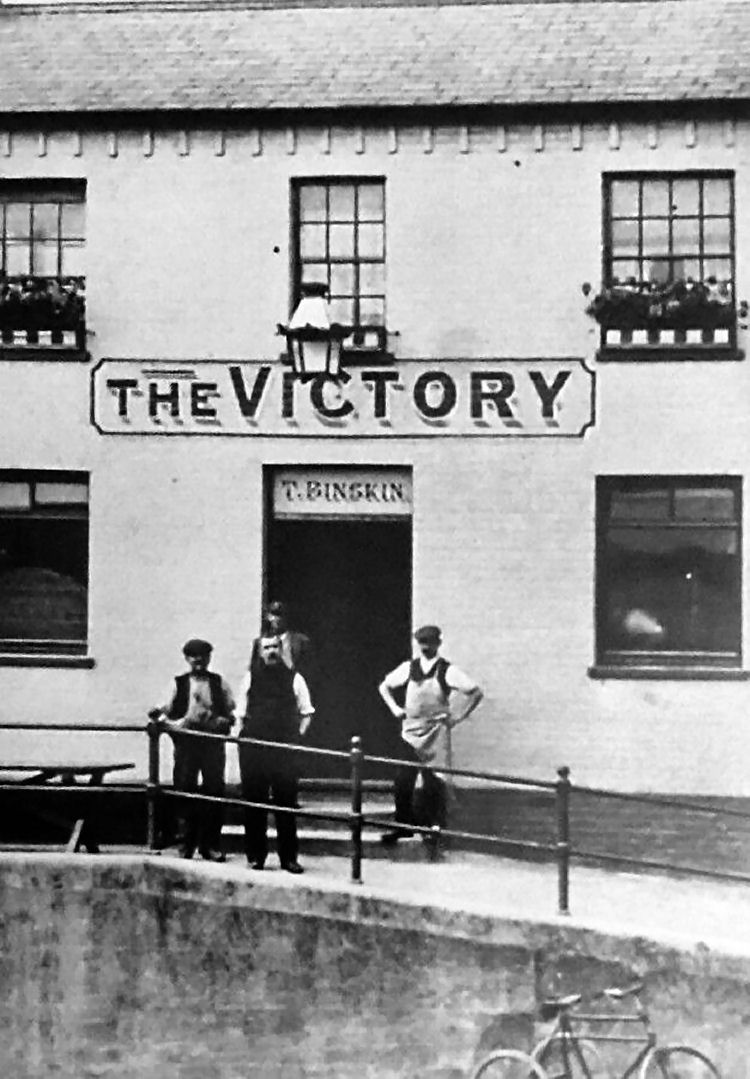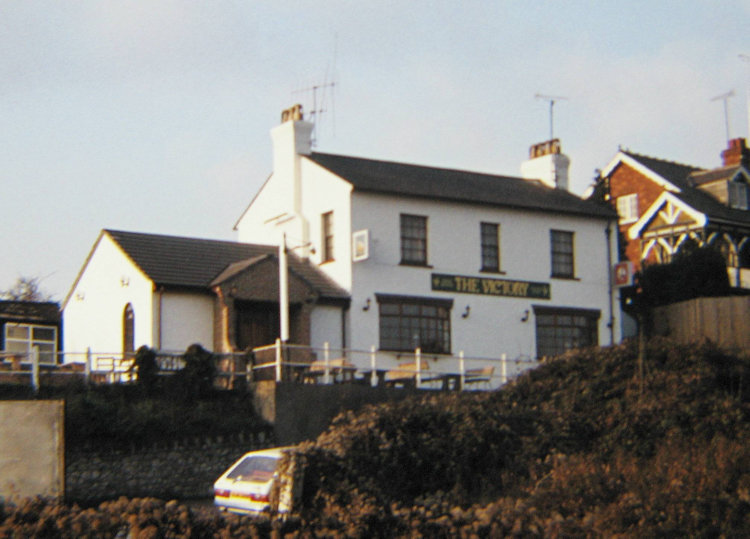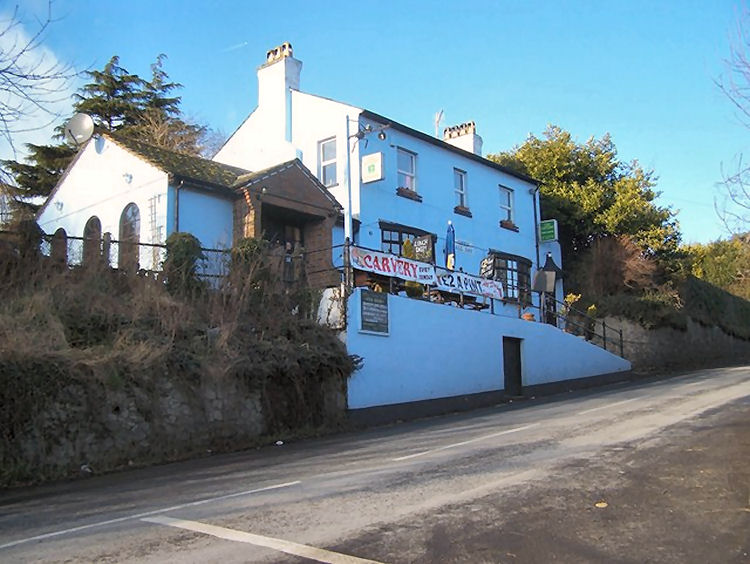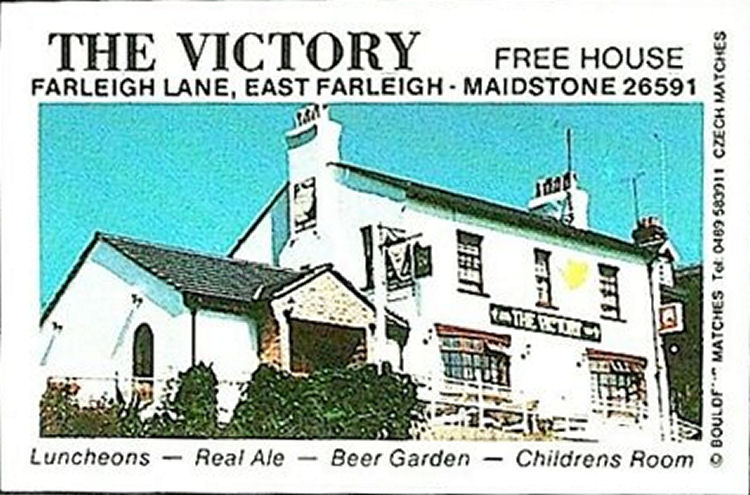|
Maidstone Journal and Kentish Advertiser 27 January 1891.
Fatal accident on the ice.
It is with the sincerest regret that we have to record the death of Miss
Grace Smyth (daughter of Mr John Smyth," the respected timber merchant of
Maidstone, and Miss Maud Smythe (only daughter of the late Mr William
Smyth,) which occurred on Wednesday, under the extremely painful and
shocking circumstance detailed below. On Wednesday morning a party of
six, comprising Mr William Smythe, Mr Rowland Smythe, their married
sister, (Mrs Emery) and her husband and the two deceased ladies went to
East Farleigh for the purpose of enjoying an afternoon skating on the
River.
On arriving at Farleigh about 1 o'clock they were informed that the lock
gates were about to be opened, in consequence of the heavy flow of land
water consequent on the rain and thaw of the previous evening, and
advised not to go on, but seeing that the ice was firm, and did not show
the least signs of giving why they went on. The two Mr Smythes were in
front, the Mrs Smyths were about 50 yards behind, and Mr and Mrs Emery
were about 50 yards behind them. About 100 yards above Farleigh Bridge,
and just above the poplar trees, the river widens out for a short
distance and here there is a spring which has the effect of, to a
certain extent, thawing in the ice.
This spot has been one of the weakest places in the River. The two Mr
Smythes skating singly past the place without accident, but when the Misses
Smythe, who was skating together and singing a hymn, reached it, the ice
gave way, and precipitated them into the water. Mr William Smyth,
hearing cries for help, turned round immediately and skated as fast as
he could to the rescue. He jumped into the water and held them up for
some time. In the meanwhile, a man working in the Hop garden adjoining
rushed to hop pole stack and threw them some poles on the ice. Mr Roland
Smythe was trying to help the unfortunate young ladies out, when he fell in
as well. With the assistance of Mr Emery he quickly got out again, and
immediately set off to How Hill, near Wateringbury, where some of his
relatives live. The party in the water, however, were in an appalling position of jeopardy.
The water, owing to the lock gates and sluices being opened, was rushing
down at a rate of about four or five miles an hour, and it was with the
greatest difficulty the persons in it could keep their heads above the
surface. The intense cold increased the terrors of the situation. At
last Mr Smythe felt that he could do no more, and he had perforce to
leave go, all the whole three must have gone down together. He with the
greatest trouble succeeded in reaching the land, and in the interval the
young ladies, been greatly exhausted, were drawn under the ice by the
current, and have not yet been recovered.
Dr Monkton quickly reach the spot, and under his directions a boat was
floated and the river was dragged for some considerable time, but with
no result. On Tuesday and Friday, under the direction of Mr T Elmore,
several men were engaged in dragging the river and breaking the ice.
What makes the affair so much more sad is that Miss Grace Smythe had
just attained her majority, and the previous evening festivities took place in
her honour at her father's house in London Road. Mr Smythe was away in
Wiltshire at the time of the accident, and the greatest sympathy is
felt with him, his wife and family, at the sudden and awful bereavement
they have sustained.
The family were held in the highest respect in the town, and Miss Grace
Smythe was a great favourite with all who knew her. Miss Maud Smythe was
an only daughter. Mr John Smyth returned home on Thursday night. After
consulting with Dr Monckton as to the best means of recovering the
bodies, the latter gentleman proceeded to Chatham on Friday morning to
interview the offices in command of the Royal Engineers with a view to
blowing up the ice with explosives. On Saturday some submarine engineers
from Chatham went to Farley, and dived in the River, but without success,
the task owing to muddiness of the water and the strength of the current
being a most difficult one. The ice was quickly disposed of owing to the
rapid thaw, and the river is now practically clear.
The inquest.
An inquest on the body of Miss Grace Smyth was held at the
"Victory Inn," East Farleigh, on Saturday, before the coroner Buss. Mr
G. C. Froud was chosen Foreman of the jury, who at the outset proceeded
to view the body which was lying in an empty cottage near the Waterworks.
The evidence was then taken:-
James Emery, solicitor, of
Broadstairs, said he knew the deceased, she was his wife's sister, and
was 21 years of age. On Wednesday last he saw her at breakfast, as he was
staying at her father's house. It was proposed later in the day to go
skating, and they left Maidstone by the 12.02 train. They were in the
party Mr William and Mr Roland Smythe, Miss Grace Smythe, Miss Maud Smythe,
Mr Emery, and himself. They got out at Farleigh station, and then proceeded
to the ice.
There were a great many people on the ice when they got down there, and
about 20 men with chairs, prepared to put people's skates on. They began
skating about a quarter past 12 They all started off together and skated about
up and down the river for about three quarters of an hour. Sometimes he
was skating with one member of the party, and sometimes with another.
There was no cracking of the ice at all previous to the accident, and
the only thing which excited there suspicion was some dispute between
the chair-men on the ice, and the man who was in charge of the lock. The
lock Keeper told the men that they had no business to put people skates
on as the ice was not safe, and they replied that that was there living.
He did not hear the conversation, but he called out to the lock Keeper
afterwards and asked him what was the matter. He replied - as near as he
could remember, "Oh, nothing at present." About 2 minutes before the accident,
Mrs Emery, Miss Maud Smythe, and himself were skating on the opposite side of
the river to the tow path. There was a man on the bank on the side and he
said the ice was 7 or 8 inches thick.
The man also added to use his own words "That it would bear a wagon and
Horses." There was a number of people passing them on the ice. Just
before they spoke to that man, witness left his wife and Miss Maud
Smythe together and went up the river towards Barming. He turned where the
ice
was broken and was looking at the time at a piece of ice which was
floating underneath, when he heard his wife scream. He then saw the two
girls in the water and skated down to them as fast as he could and threw
himself flat on the ice. The younger brother was there and he called on
him to do the same. Witness caught hold of Miss Maud Smythe by one arm and she was
clinging to Miss Grace, who was lower down in the water, by the other.
Miss Maud Smythe called out, "Oh save Grace, save Grace."
There was nobody else but Mr Roland Smythe there then;
everybody else cleared off as quickly as they could go. He remained in
the same position for what seemed seconds when the ice gave way, and all
three went in together. When he came up again to the surface of the
water, he caught Miss Maud Smythe with one arm around her waist and he
thought at the time she had hold of Miss Grace, but she cried out "Oh!
Grace is gone, Grace is gone." Nobody came up during that time. After
Miss Grace had gone he tried to comfort Miss Maud, and told her if she
kept still they would be saved, and just as he had spoken the ice broke
again and they both went under. They came to the surface, and he clung
to her with his knees, while he tried to get hold of the ice, when the
current seemed to drag her out of his grasp.
He then held onto the ice with his hands, and the next thing he
remembered was Mr Roland Smythe clinging to him. He was in the water
himself, but witness did not know how we got in. Mr Roland Smythe also
fell into the water, and witness pushed him towards where the ice was
stronger, and it was after he had reached it that Mr Williams Smythe came
skating up the ice with a hop-pole. The ice kept breaking as they got on to
the edge, and it was a very little way from the bank of the river. He
did not think he had skating on that side of the river. The ice there
was black ice, but on the other side it was whiter and looked stronger.
There were people skating up and down the river, but he did not know
whether they went over the exact spot where the accident happened.
No one else came near them to help except the two Mr Smythes, and
there were no poles thrown onto the ice. There was no suggestion at all
that the ice was not safe except the dispute between the man at the
locks and the men on the ice with chairs. It seems that the spot where
the accident happened was known to be dangerous, though he was not aware
of it. Deceased have been skating on the river frequently. His watch
stopped at five minutes to one, so the accident must have occurred just before that
time.
Philip Pearson, of Barkers Cottage, East Farleigh, a cripple, said he
was a working man on the roads. About half-past 12 on Wednesday, deceased was
talking to him, and there were four others with her. Mr William Smythe
was not there then. Witness was trying the ice with a pole to see how
firm it was. he told deceased it was 8 or 9 inches thick where he was
standing, but that was not safe up above.
Two of the young ladies then went away. Witness was not on the ice
himself. One young lady and himself try to persuade the others to come back, as
they heard the ice cracking. He saw them go into the water, and threw
poles to them as fast as he could. There were four persons in the water
at one time.
Walter Ring, a labourer, of Maidstone said he was engaged on
Thursday afternoon to drag the river. There were two other men in the
boat, and he had a boat hook. He recover the body on Friday afternoon,
and it was then in the water underneath the poplar trees on the opposite
side off the spot to the towing path, and was as near as he could get;
10 or 12 feet away from the bank. There were at the time between six and
seven feet of water there, as it had been lowered about three feet. Deceased
had on a short jacket and a light dress, but there was nothing on
her head. The place where she was found, was known as Clackets hole.
Mr William Taylor Smythe was next called. He said he lived at Maidstone
(with his father,) and at Kemsing. He was brother to the deceased, and
he corroborated Mr Emery's evidence, up to the time of going onto the ice.
He added that the time of the accident he was skating down by Farleigh Bridge, and he heard no screams of any sort. Someone ran down the bank
and said there was someone in the water. He had a strong idea it was one
of his party, and when he had gone about half way up, he met someone
else who said his brother-in-law was in the water. He skated up as hard
as he could, and all he saw was his little brother just getting out onto
the ice and his brother-in-law in the water. he saw the man Pearson
standing still on the bank with a pole in his hands in an upright
position. Witness called out for "For God's sake give me that Pole," but he
did not take any notice. Witness at lasts managed to get the pole, but
as for saying that anyone threw anything onto the ice there was no help
at all. If they had been they might have all been saved.
Pearson said he was a cripple, and he could not get out of the ditch to
give any help. He did all he could buy throwing poles on.
Witness,
continuing, said there was not a pole thrown; that he was prepared to
swear.
Mr Emery also said there was no poles thrown.
Mr Smyth said there
was no one on the ice accept his sister, Mrs Emery, who was "like a mad
woman," and kept crying out. "Help him, help him," meaning her husband.
Witness had no idea that his sister and cousin were in the water too. He
never saw them again after they were talking to the man on the bank.
There were plenty of people about, and they could have saved them if
they had liked. Pearson was the only man he saw on that side of the
bank, but witness saw some people running about on the other side.
Pearson again reiterated his statement that he was a cripple and could
not get out of the ditch.
Mr Smythe:- Did I not come a quarter
of an hour before, and reprimand you for saying the ice was safe all
over? I remember your face too well.
The Coroner suggested that they
should not dispute the matter.
Mr Coppen, the lock Keeper at
Farleigh, who was also on the jury, was permitted to make a statement.
He said he saw the party come onto the ice, and he told the chair-men
that the water was rising, and they are not to be there. He spoke to
them about the plank from the bank on to the ice. One of the men replied
that it was their living. He (Mr Coopen) knew the unsafeness of the water
as the water has been drawn off several times, and the chair-men ought not
to have invited people to go on. He told them it was going to draw the water
off then.
Mr Emery said they might have driven a thousand people over at that point. It
was only at the particular place where the accident happens that the ice
was unsafe. Continuing, he said to Coppen: "Did I not ask you when you
were talking to the chair-men what was the matter? And you said "Oh,
nothing at present."?
Mr Coppen replied that he thought Mr Emery must
have heard what the altercation was about, and he thought he was
chaffing him.
The coroner having summed up the evidence, said this was a
matter in which hard things might be said on one side, perhaps without
much reason or without anything which really affected the case, but he
thought on a general view of the evidence it would be very difficult for
them or for anyone else to say that there was any fault attached to
anybody as the cause of that very unfortunate affair.
The young ladies themselves appear to have made enquiries, and they also
appeared to have been warned, or at any rate it was said that the ice
was not safe in all parts. He thought, under the circumstances, they
could not return any other verdict than that deceased died from drowning
through falling into the river while skating. He was sure that they
would agree with him that their sympathies were due to the parents of
that poor young lady, and to the parents of the young lady whose body was
still missing. It was a sad case. It had concerned him very much, and he
thought those who knew the parents better than he did must know the state
of mind that they must be in at that time. He was sure they must
sympathise very much with them, and he would concur in any expressions of
condolence with they might convey to them.
The Foreman of the jury said the jury were agreed upon return a verdict
of "Accidentally Drowned." He said they were of the opinion that no blame
attached to the man Pearson, but they recommended that the proper
authorities should be requested to provide means for the saving of life
in view of future accidents. With the parents of the deceased young
ladies the jury heartily sympathised, and they would like an expression
of condolence to be conveyed to them.
The Coroner, in referring to
the desire on the part of the jury that he should write to the Medway
Conservancy Board as to proper life saving apparatus being supplied,
said he has written to them several times before, but they had replied
that if localities wanted any particular means of saving life they must
supply it themselves. Nevertheless, he would write to them again.
The
jury were then discharged.
DISCOVERY OF THE SECOND BODY.
The body of Miss Maud Smyth was recovered yesterday (Monday) morning
between 8 and 9 o'clock. Dragging operations had been carried on every
day since the accident, and it was not till yesterday that the men
employed for the purpose succeeded in recovering the body, which was
lying about Midway between Folly Bridge and Clacketts hole, where the
body of Miss Grace Smyth was found. The inquest will be held at the
"Victory Inn," East Farleigh, today (Tuesday,) at 5 o'clock.
|





